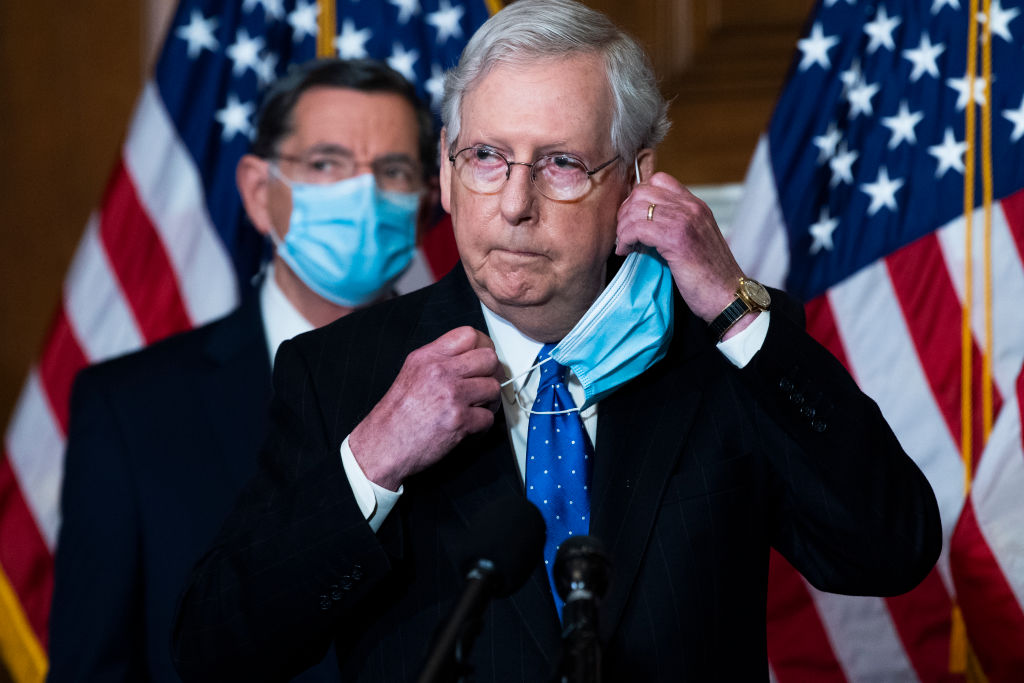U.S. government funding runs out Friday, and Congress will likely punt


A free daily email with the biggest news stories of the day – and the best features from TheWeek.com
You are now subscribed
Your newsletter sign-up was successful
The federal government's funding authorization runs out on Friday, President Trump has threatened to veto a must-pass defense authorization bill, and pressure is building on Congress to approve its first major COVID-19 relief legislation since April. "The coming days will require bicameral, bipartisan coordination and some buy-in from the outgoing White House to avoid a complete debacle," Politico's Burgess Everett reports, and as Congress faces this lame-duck "hell week," Trump is mostly focusing on "his flailing legal and political attempts to overturn the election."
The most promising prospect for success is the $740 billion National Defense Authorization Act, which the House will vote on Tuesday and appears likely to get veto-proof majorities in both chambers. A bipartisan group of senators is still hammering out a $908 billion COVID-19 package that House Democratic leaders have endorsed as a good starting point. Senate Majority Leader Mitch McConnell (R-Ky.) is "noncommittal," Politico reports, and "Trump is always a question mark."
House Democrats have passed two relief packages since the summer, while the Senate has approved none. The bipartisan Senate group has come to agreement on funding for state and local governments, Politico's Playbook reports. but "they are hung up on liability overhaul" and "all eyes are on McConnell" for a second round of direct checks to Americans, a provision with "new urgency" from Republican negotiators as well as most Democrats.
The Week
Escape your echo chamber. Get the facts behind the news, plus analysis from multiple perspectives.

Sign up for The Week's Free Newsletters
From our morning news briefing to a weekly Good News Newsletter, get the best of The Week delivered directly to your inbox.
From our morning news briefing to a weekly Good News Newsletter, get the best of The Week delivered directly to your inbox.
Congress will likely pass a weeklong stopgap spending bill, keeping funding at current levels while allowing negotiators to iron out an omnibus spending package financing the federal government through September. If no omnibus deal emerges before Dec. 18, Congress will probably pass a three-month continuing resolution. "The Senate is targeting roughly Dec. 18 as its adjournment date, and McConnell is still looking to confirm nominees this week," Everett reports.
A free daily email with the biggest news stories of the day – and the best features from TheWeek.com
Peter has worked as a news and culture writer and editor at The Week since the site's launch in 2008. He covers politics, world affairs, religion and cultural currents. His journalism career began as a copy editor at a financial newswire and has included editorial positions at The New York Times Magazine, Facts on File, and Oregon State University.
-
 5 calamitous cartoons about the Washington Post layoffs
5 calamitous cartoons about the Washington Post layoffsCartoons Artists take on a new chapter in journalism, democracy in darkness, and more
-
 Political cartoons for February 14
Political cartoons for February 14Cartoons Saturday's political cartoons include a Valentine's grift, Hillary on the hook, and more
-
 Tourangelle-style pork with prunes recipe
Tourangelle-style pork with prunes recipeThe Week Recommends This traditional, rustic dish is a French classic
-
 Key Bangladesh election returns old guard to power
Key Bangladesh election returns old guard to powerSpeed Read The Bangladesh Nationalist Party claimed a decisive victory
-
 Epstein files topple law CEO, roil UK government
Epstein files topple law CEO, roil UK governmentSpeed Read Peter Mandelson, Britain’s former ambassador to the US, is caught up in the scandal
-
 Iran and US prepare to meet after skirmishes
Iran and US prepare to meet after skirmishesSpeed Read The incident comes amid heightened tensions in the Middle East
-
 EU and India clinch trade pact amid US tariff war
EU and India clinch trade pact amid US tariff warSpeed Read The agreement will slash tariffs on most goods over the next decade
-
 Israel retrieves final hostage’s body from Gaza
Israel retrieves final hostage’s body from GazaSpeed Read The 24-year-old police officer was killed during the initial Hamas attack
-
 China’s Xi targets top general in growing purge
China’s Xi targets top general in growing purgeSpeed Read Zhang Youxia is being investigated over ‘grave violations’ of the law
-
 Panama and Canada are negotiating over a crucial copper mine
Panama and Canada are negotiating over a crucial copper mineIn the Spotlight Panama is set to make a final decision on the mine this summer
-
 Why Greenland’s natural resources are nearly impossible to mine
Why Greenland’s natural resources are nearly impossible to mineThe Explainer The country’s natural landscape makes the task extremely difficult
